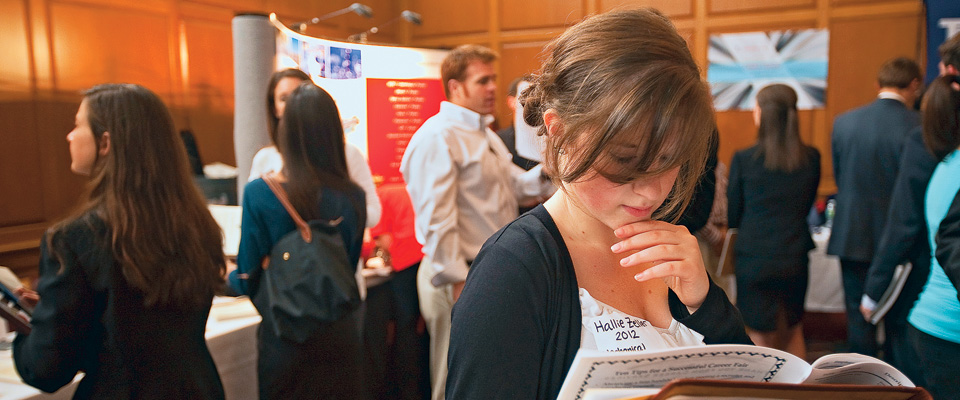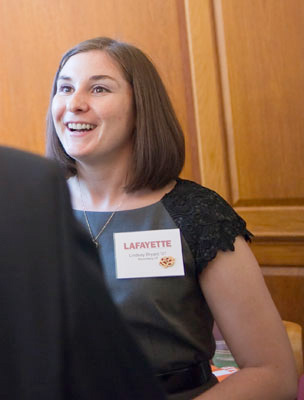Personal and Powerful

by Geoff Gehman ’80 | photography by Chuck Zovko
For Melissa Drennan ’12, an internship last summer came with a bonus: a personal career caretaker who had graduated from Lafayette.
Nalishha Mehta ’98, a program officer for the Solidarity Center in Washington, D.C., mentored Drennan as the student planned events and tracked donations in the Atlanta office of Amnesty International. Mehta advised Drennan on how to make a good impression on the job (stay enthusiastic, no matter how boring the task) and after the job (stay on the organization’s radar by sending an email or a holiday card every six months or so). Available whenever for whatever reason, Mehta also helped Drennan cope with living in a strange city and with the death of a family member.
Mehta became a “phenomenal friend” to Drennan, a government and law/psychology major. And Drennan inspired Mehta, who specializes in improving working conditions in East Africa. “I was very impressed with Melissa’s maturity, good attitude, intelligence, and initiative,” Mehta says. “I admired her. I remember wondering if I was as put-together as she is at that age.”
Drennan and Mehta personify the personal, powerful partnerships forged in Gateway, the four-year program of individualized counseling offered by the Office of Career Services. Launched in 1996, Gateway is a flexible network for finding the right jobs, getting into the right graduate and professional schools, and not only surviving but thriving during difficult economic times.
“We’re not just about using online services and going to workshops,” says Linda Arra ’74, who has served as director of career services since January 2003. “We help students know what they want to be in the world, and where.”
When it comes to the College’s newest students, Arra and her staff concentrate on persuading first-years to admit they have no idea what they want to do after college — and to feel comfortable with that.
“We try to convince them to treat college as a blank slate,” Arra says. “We tell them to do things they didn’t do in high school. You can try anything here because nobody knows your strengths and weaknesses.”
Career planning at Lafayette is methodical, like a fouryear course. First-year students are encouraged to meet with their Gateway counselor and begin to explore their options. Sophomores are steered toward internships, research, community volunteering, and other experiential activities. The third year includes preparing for graduate-school entrance exams and attending networking programs on and off campus. Continuing their networking and conducting mock interviews with alumni are some of the things on the calendar for seniors. Throughout, students are encouraged by their Gateway counselor to participate in the programs and pursue the particular opportunities that will best help them develop and refine their individual goals.

Lindsay Bryant Dutch ’07 of Bloomberg
Gateway graduates praise the program as efficient and effective. Lindsay Bryant Dutch ’07, a math major who wrote an honors thesis on pricing credit default obligations, says she received valuable advice about interviewing.
“I learned that you should say why you’re a great match for the company rather than just rambling about how great you are or how great the company is,” Dutch says. She parlayed the insight into a job as a researcher for the business news giant Bloomberg LP.
Sarah Reddan ’09 entered Lafayette not knowing what she wanted to do for a living. A double major in history and art, she had a better idea after an internship with Easton-based Lou Reda Productions, where she organized footage for the History Channel documentary WWII in HD, and an externship at ABC News. Today, she is an associate account executive at Full Six, a marketing firm whose clients range from Coca-Cola to L’Oréal. She found the position in Gateway’s Career Vault, an online marketplace for students and employers.
Like Reddan, Maurice Bennett ’06 arrived on College Hill unsure about career aspirations. He chose Lafayette partly because of what Gateway offered. “I’m an intelligent guy who likes to ask a million questions. But I needed guidance, and career services gave it to me. Someone was there all the time to talk about what I needed to read, to walk me through all the options,” he says.
Bennett capitalized on his options. After an externship with a real-estate investor in his native Philadelphia, the economics and business major served one internship with Cintas Corp. through Inroads, a nonprofit that provides internships to minority students and trains them for professional careers in business and industry, and another with the financial-services firm Credit Suisse First Boston through SEO, Sponsors for Educational Opportunity, which also serves young people from underserved communities.
During his career exploration and job search, Bennett interviewed more than 30 times because “there’s no way to really mimic a live interview where your answers make a difference.” Along the way he learned to shrug off rejection. “It’s like being out dating. Being rejected doesn’t mean you’re a bad guy, it just means you got rejected.”
Bennett’s investments paid big dividends. After his junior year, he received a job offer from Credit Suisse. As a senior, he wrote a thesis on wealth in America (“why whites build it and blacks don’t”) and made 133 tackles as a linebacker on the Patriot League title-winning football team. The Associated Press named him first-team All-America, and the league named him top scholar-athlete in football. Drafted by the Chicago Bears, Bennett attended rookie camp but decided to pass up the possibility of playing in the National Football League. As he points out, he didn’t want to mess up a “messed-up” Achilles tendon or his Credit Suisse training. Besides, a career in finance seemed safer and, potentially, more lucrative than a career in football.

Maurice Bennett ’06 of Credit Suisse
Today, Bennett trades companies going into or out of bankruptcy. He owns a Philadelphia barber shop that his brother runs and dispenses Gateway advice while recruiting on College Hill. “I tell Lafayette kids, ‘You really have to get involved in career planning in your first year. You have to look for job sites online, ask a million questions. If you wait until your senior year, it’s over.’”
ALUMNI AND PARENTS’ SUPPORT
Bennett belongs to a global village of alumni who support Gateway. One is his former teammate Jason Mills ’09, who was named first-team all-Patriot League defensive end as a senior. An electrical and computer engineering major, Mills asked more than a dozen alumni in the energy industry for advice during his job search. He thanks John Donleavy ’78, former CEO of Vermont Electric Power Company, for insights on leadership, creativity, and overcoming adversity. Today, Mills is a distribution system engineer for Pepco Holdings Inc., a utility umbrella. This year, he added another link to the Lafayette job chain by hiring Nicholas Wilson ’10, whom he had previously hosted in an externship.
Externships with alumni have been a robust tradition for 30 years. David Albala ’78, an internationally known authority on laparoscopic and robotic urological surgery, has hosted Lafayette students for nearly half that time, at three different universities. He’s proud that medical schools have accepted every one of his 40-plus protégés. The group includes Jodi Antonelli ’02, a resident in urology at Duke University Medical Center, Albala’s former employer.
“In medicine, I’ve accomplished the things I’ve wanted to accomplish — a full professorship, 170 articles, five books,” says Albala, who is establishing a robotics division at Syracuse University. “I don’t need to do things for me. The real benefit is helping young people in their careers. The real satisfaction is watching them succeed.”
Albala’s parental pride is matched by that of parents who serve the Gateway program. Janice Selinger P’09 coordinates externships at her public television and radio station in Trenton, N.J. “It’s a chance for students to observe, to research, to find out if they might want to work in this field,” says the acting executive director for NJN and its foundation.
Providing guidance to graduates is another Gateway service. Counselors answer questions about everything from dealing with sudden unemployment to finding an affordable apartment. “It’s not just about conveying information,” Arra says. “It’s more along the lines of, ‘Have you run out of leads? How are the interviews going? Do you want us to set up a mock interview for you in New York? Can we give you advice about approaching your boss to join a certain team?’”
Arra provided crucial assistance to Kavinda Udugama ’09, an electrical and computer engineering major. Last year, Arra helped the Sri Lanka native land a job in the New York office of a French technology consulting firm. This year, she helped him when he was at risk of losing his visa and his position due to a change in U.S. immigration law. She contacted Angel Mendez ’82, a Lafayette trustee who is senior vice president for Cisco Systems Inc. After interviewing for several positions at Cisco and receiving two offers, Udugama became a program specialist in Mendez’s department, customer value chain management, and Cisco arranged to have his visa extended.
“Linda played the role of life coach because I had a lot of hurdles,” Udugama says. “I tell her all the time that I would probably have gone home if she hadn’t taken up my cause.”
SERVICE BEYOND THE CALL
Alicia Krebs ’08 has used Gateway to explore gateways to three professions. After her junior year, the history/ government and law major tested life in Congress by interning with New York Sen. Charles Schumer. As a senior, she decided to become a paralegal on the advice of Maureen Walz Boehmer, career services’ associate director for special programs. Boehmer improved Krebs’ cover letters and directed her to alumni who shortened her list of law firms to contact. After graduation, she worked for 15 months as a case assistant at the international firm Kirkland & Ellis LLP.
Krebs soon discovered she was more devoted to public policy than litigation. She returned to Boehmer, who suggested essay topics for her graduate-school applications and offered proofreading help. Krebs was accepted into the highly competitive master of public administration program at the London School of Economics and Political Science.
Krebs fine tunes her career plans with tips from Boehmer and Lafayette graduates who serve as financial consultants in London. She hopes her master’s degree will help land her a job — perhaps with a private bank, perhaps with the Federal Reserve — helping public agencies recover from the recession.
Excellent services are especially important during the worst job market in Arra’s 20-plus years as a college career counselor. She can’t remember another time when there were cutbacks in virtually every area. One of her most sobering statistics comes from the National Association of Colleges and Employers, which found that only 38 percent of 2010 graduates received at least one job offer. By comparison, the figure for the pre-recession Class of 2007 was 66 percent.
Service beyond the call is characteristic of Arra’s term as Gateway guardian. She has made significant additions in career services, including networking nights for undergraduates and graduates, web-based tutorials on a range of job-search topics (an antidote to unreliable for-profit sites), mock interviews via phone, career-counseling appointments via Skype for students abroad, and the new Intern Scholars program, which debuted last year. Made possible by the generosity of George (Sonny) Whelen IV P’10, it provides students serving summer internships with a stipend and matches them with a mentor, as with Drennan and Mehta.
Last spring, Arra was the recipient of the College’s Administrator of the Year Award at the annual Aaron O. Hoff Awards ceremony, where individuals are honored for dedication and commitment to the College community. It goes to an administrator (nominated by students) “who has acted with professionalism and integrity and succeeded in producing meaningful change.” Sometimes she comforts worried job-seekers with what amounts to down-home wisdom.
“I tell them I graduated during a bad recession, too, and I was a psychology and Spanish major. If I can do it, you can do it. I didn’t wind up a bag lady, and neither will you.”
Mehta shares Arra’s nurturing manner. Last summer, she helped Drennan prepare for a career by reminding the student to ask questions, keep her integrity, and request an exit interview to understand better the pros and cons of her performance as an intern at Amnesty International.
Mehta then strengthened her role as career caretaker by sending Drennan a welcome-back-to-school care package of snacks. She gave this gift in gratitude for gifts she had received. Helping Drennan, Mehta says, had helped her realize how Lafayette helped her help workers around the world.